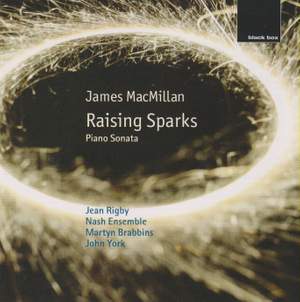James MacMillan: Raising Sparks
Jean Rigby (mezzo-soprano), John York (piano)
Nash Ensemble, Martyn Brabbins
Martyn Brabbins and the Nash Ensemble here offer a superb recording premiere of a major work by James MacMillan. Like much of his music, it has a religious base. The big difference this time... — More…
Downloads
What are FLAC and MP3?Contents
MacMillan: Raising Sparks
Work length34:06
$0.85
$1.15
- The Nash Ensemble (chamber ensemble), Jean Rigby (mezzo-soprano), Ian Brown (piano), Philippa Davies (flute), Richard Hosford (clarinet), Marianne Thorsen (violin), Elizabeth Wexler (violin), James Boyd (viola), Paul Watkins (cello), Skaila Kanga (harp)
- Martyn Brabbins
- Recorded: 2001-05-21
- Recording Venue: Angel Recording Studios, London
MacMillan: Piano Sonata
Work length14:01
$2.55
$3.45
- John York (piano)
- Recorded: 2001-05-21
- Recording Venue: Angel Recording Studios, London
I: Adagio
Track length2:36
$0.85
$1.15
II: Grandioso ed affrettando
Track length9:17
$0.85
$1.15
III: Adagio
Track length2:08
$0.85
$1.15
MacMillan: For Ian
Work length4:57
$0.85
$1.15
- John York (piano)
- Recorded: 2001-05-21
- Recording Venue: Angel Recording Studios, London
MacMillan: Birthday Present
Work length2:17
$0.85
$1.15
- John York (piano)
- Recorded: 2001-05-21
- Recording Venue: Angel Recording Studios, London
MacMillan: Barncleupedie
Work length1:52
$0.85
$1.15
- John York (piano)
- Recorded: 2001-05-21
- Recording Venue: Angel Recording Studios, London





